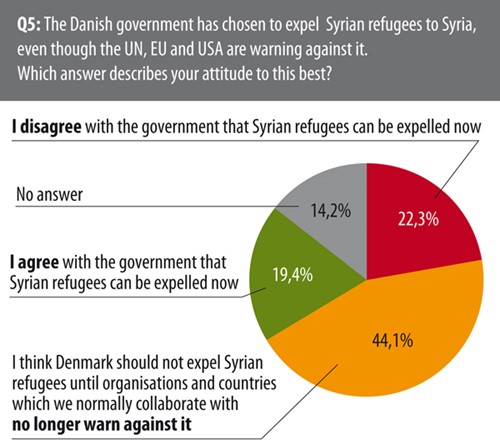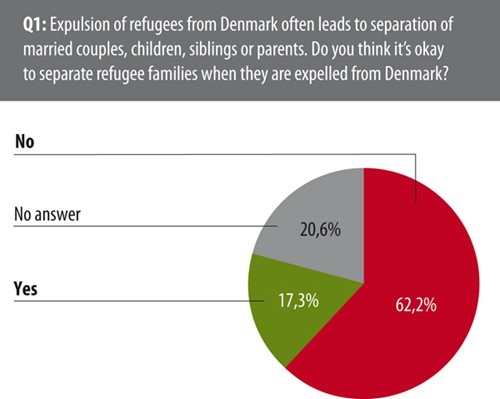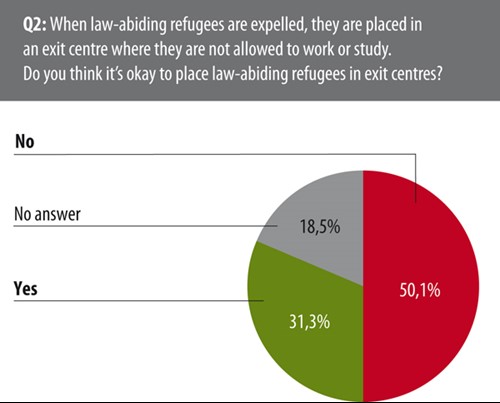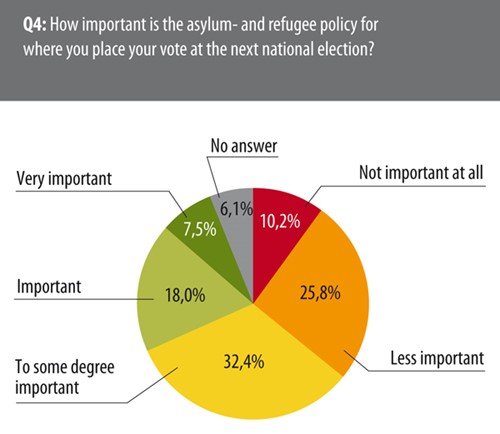New survey: Danes do not support strict refugee policies
Remarkable figures suggest that Denmark's Social Democratic government is out of step with its voters
Download the survey from Voxmeter here (in Danish)
The government's harsh refugee policies are often defended with reference to voters' will: "it might be harsh, but it's the policy the voters want". However, according to a new survey, there might be much less support for harsh refugee initiatives than politicians and media express. In fact, support is lagging considerably in specific parts of the asylum policy — and even more so among the Social Democrats' own voters than among the average voter.
Out of step with the population
According to the new survey, the Danish population is particularly critical of specific refugee policy initiatives. Among other subjects, the survey asks people's opinions on matters such as the keeping of refugees in deportation centres, separation of refugee families and revoking permits to Syrian refugees. Opinions on returning refugees to Syria are particularly worth noticing, as shown in figure Q5 below.
The survey shows that only 19% of Danish voters agree with government's plans to expel Syrian refugees for the time being. Among the Social Democrats' own voters, a mere 15% agree. Even among voters of the right-wing Danish People's Party's, a surprising 33% are against the expulsion in their current form.
Denmark is the only country in the world beside Hungary which has begun revoking permits to Syrian refugees. All neighbouring countries and collaborators such as the UN and the EU discourage all involuntary returns to Syria, where the life and security of returned refugees remain in imminent danger.
An important election topic – for whom?
The survey also indicates that refugee policy is not as important a topic for voters after all. In fact, only one in four (25,5%) of voters say that the topic is important or very important to them. Apparently, it is not the voters who continue to put harsher refugee policy initiatives on the agenda.
The repetition that "the policy follows the will of the people" now sounds rather hollow. The current policy is out of step with the government's own voters – and the population at large. In fact, these harsh policies enjoy much greater support among voters of the right-wing Danish People's Party and the ultra-right-wing New Right than they do with voters of the Social Democrats.
The survey suggests that politicians have gone too far, allowing a fragile hope for more lenient policies in the future.
Significant reluctance among Social Democratic voters
According to the numbers, the Social Democratic voters are even more critical of the government's refugee policies than the average voter, and they attach rather low priority to the topic.
• 66% find it wrong to separate refugee families during expulsions from Denmark.
• 53% find it wrong to place law-abiding refugees in deportation centres.
• 72% oppose revoking permits to Syrians or think the government should wait until international partners have similar security estimations. Only 15% agree with the return policy in its current form.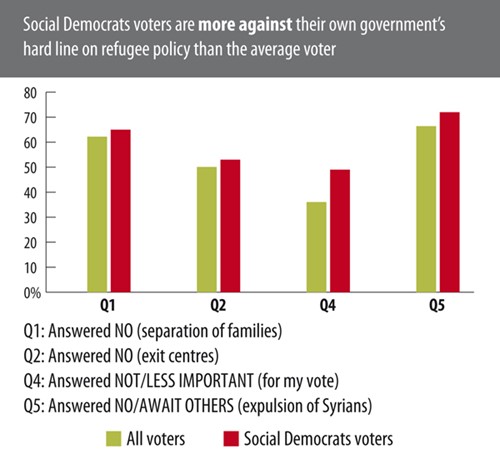
Nevertheless, roughly half of Social Democratic voters respond that they generally support the government’s refugee policy. When questions remain vague, voters agree to support the overall political line. However, when the questions concern specific policies that the government is currently enforcing – for instance the separation of families, the returning of Syrians, the deportation centres etc. – respondents withdraw their support.
The discrepancy between general, abstract support and the support for concrete measures is likely related to the fact that many do not know exactly what the current refugee policy actually entails. Many might support an abstract idea, but have a harder time standing by the actual initiatives. For instance, some are probably surprised that the government policy leads to separation of refugee families. Responses to this matter is shown in figure Q1 above**.
The credibility and tendencies of the survey
The survey was conducted by the well-known Danish analysis institute Voxmeter and was ordered and paid for by a Facebook group called "Citizens who do NOT support the government's immigration policy" with more than 40,000 members. The survey is based on responses from a representative sample of the Danish population over 18 years old. There are 1,033 participants, which is considered the most accurate sample size for statistical purposes. The surveys credibility is also supported by the fact that it points to a number of well-known tendencies with regards to:
Geography: Support for the government policy is highest in the South Denmark Region, while it is lowest in the Capital Region. Dissatisfaction with the return of Syrians is very pronounced in the Capital Region.
Age: Compared to other age groups, the youngest group of 18-34-year olds strongly oppose to separation of families. Generally, this age groups stands out as far more dissatisfied with the government policies. In turn, the broadest support is found in the group of 50-64-year olds.
Gender: Comparing answers by gender, there is a tendency that women are more often against government policy, particularly with regard to expulsion and separation of families.
*) We have omitted the use of the reports question Q3. Here, just over half of the population respond that they predominantly disagree with Denmark's refugee policy. Regrettably, the question is phrased in a way that does not clarify how many responses are "dissatisfied" because they want a more humane policy and how many are "dissatisfied" because they want an even harsher policy.
**) In the surveys formulation of question Q1, it states that married couples are often separated in deportations. That is not the case. However, it is quite true that children over 18 years are often separated from their parents and that siblings are often separated.
Did you like the article?
Become a member and help us continue!



